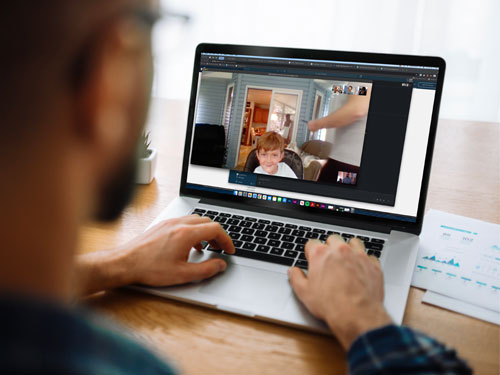Businesses are constantly bombarded with different marketing strategies. Executives feel pressure to send out email newsletters, actively blog, create more video content, search optimize their website, and of course, invest in paid search campaigns.

While it may seem daunting, you don’t have to do it all yourself. Find a digital marketing agency that can wear all the different hats required for your advertising strategy. Because the evidence shows, it’s imperative that companies grow their businesses on multiple fronts, including pay-per-click (PPC) campaigns.
A Pay-Per-Click (PPC) Campaign Overview
Arguably the most popular paid-search product is Google AdWords. In fact, according to Search Engine Island, Google took 77.8% of the U.S. search ad revenue in 2017. This market share is largely due to their ability to capture mobile search traffic. However they’re not the only game in town.
Bing, Yahoo, Facebook/Instagram, Amazon, LinkedIn, Twitter, and Pinterest all offer their own version of PPC campaigns. When you’re evaluating which direction to take, ask yourself:
- Do I want to appeal to search engine users while they’re actively looking for my products and services? Or:
- Do I want to showcase my brand to a particular audience through digital content?
If your answer is the first option, your priority should be Google AdWords. If it’s the latter, you should consider a social media marketing channel (although Google’s Display network is impressive). Similarly to how Google is dominating search campaigns, Facebook is leading sponsored social posts by captivating a staggering 2.13 billion monthly active users, according to the FB Newsroom. Moreover, Facebook-owned app Instagram has a whopping 800 million users, 25 million of which are businesses.
Because of this, we’re going to focus on two PPC channels for lead generation: AdWords and Facebook.

Is AdWords Worth It?
AdWords is undoubtedly a worthwhile PPC channel for generating leads and selling products. It should be noted, however, that Google ads are not an overnight solution. In order to aggregate enough data to properly target your ads, eliminate low performing keywords, and remarket to consumers who are most likely to convert, you’re looking at a three to nine month commitment before see favorable results.
You’ve probably seen these ads before. For instance, if you type in “tailored suits” you might get results like the picture below.

Google can place your ad at the top, bottom, or side or their search results. If you look closely, you’ll notice a small box that says “ad” next to the results which delineates paid search from organic search.
Unless you change the settings of your campaign(s), you’ll only be charged when someone clicks on your headline or product. Within your AdWords account you can choose your monthly ad spend and your max cost-per-click (CPC), along with a multitude of customizations to ensure you don’t go over your allotted budget.
AdWords can be expensive, which is one of the leading reasons this advertising strategy maskers business owners and marketing teams clutch their purse strings. If you’re planning on investing less than $500 a month, you may not be ready to take the leap into a AdWords campaign. However, it’s important to keep in mind that at the end of the day, it’s more about the return on investment (ROI) than your bottom line expense.
When choosing your monthly budget, consider this: Google’s Economic Impact Report conservatively estimated that the average business makes $2 in revenue for every $1 spend on AdWords. This begs the question then, if you could double your money with an investment, how much would you invest?
There are even some hidden benefits of AdWords that many marketers forget to explain. For instance, AdWords’ Ad Rank feature ranks your ads, which can provide useful insights into how your website is performing as it evaluates the experience users have on your landing page during the ad auction process.
Your landing-page experience measures the relevancy, trustworthiness, mobile friendliness, loading time, and speed of an ad’s landing page. Because these are much the same elements that are considered in organic SEO, as you improve your landing-page experience for AdWords, you’ll also be improving your organic search ranking.
AdWords Pros | AdWords Cons |
|
|
Face It, Facebook Works
Depending on your industry, Facebook can prove to be an invaluable tool for increasing revenue. While the average ROI is going to fluctuate greatly between products and services,WorkStream highlights a few industries with stunning conversion rates on their ads, these included:
- 14.29% fitness
13.58% education
11.73% employee and job training
11.00% healthcare
10.68% real estate
10.63% B2B
Even across all industries, the average conversion rate for Facebook was 9.21%. This is impressive, considering that the average conversion rate in AdWords is 2%-3%.
The amazing part is, the CPC with Facebook is generally a fraction Google’s ad channels. So what is the downside? Consumers aren’t actively searching on Facebook for specific products and services the way they do on Google. Ultimately, it’s a matter of active searching versus passive searching.
See, AdWords captures your target market while they’re actively searching for your products and services. On the other hand, Facebook uses demographic and interest-based information to advertise to an audience that may be passively searching for what your offer.
Facebook Pros | Facebook Cons |
|
|
Perhaps the biggest deterrent to Facebook is that it’s not great for B2B (despite the high CTR), whereas AdWords is built for both. However, sponsored posts are often a great way to spread brand awareness and build trust with your potential clients.
Implementing A PPC Campaign
The most common mistake that business owners and marketing executives make is starting a PPC campaign and attempting to manage it themselves while also tending to their day-to-day responsibilities. Moreover, there is a reason both AdWords and Facebook offer classes and certifications for their advertising platforms: they’re complex and difficult to manage without training.
Mishandling your account can be incredibly costly. That’s why we recommend contracting with an experienced digital marketing agency that can handle your campaigns for you. At Werkbot, we have a seasoned team that will help you reach your advertising goals. If you’re interested in learning more, click here to contact us today.



